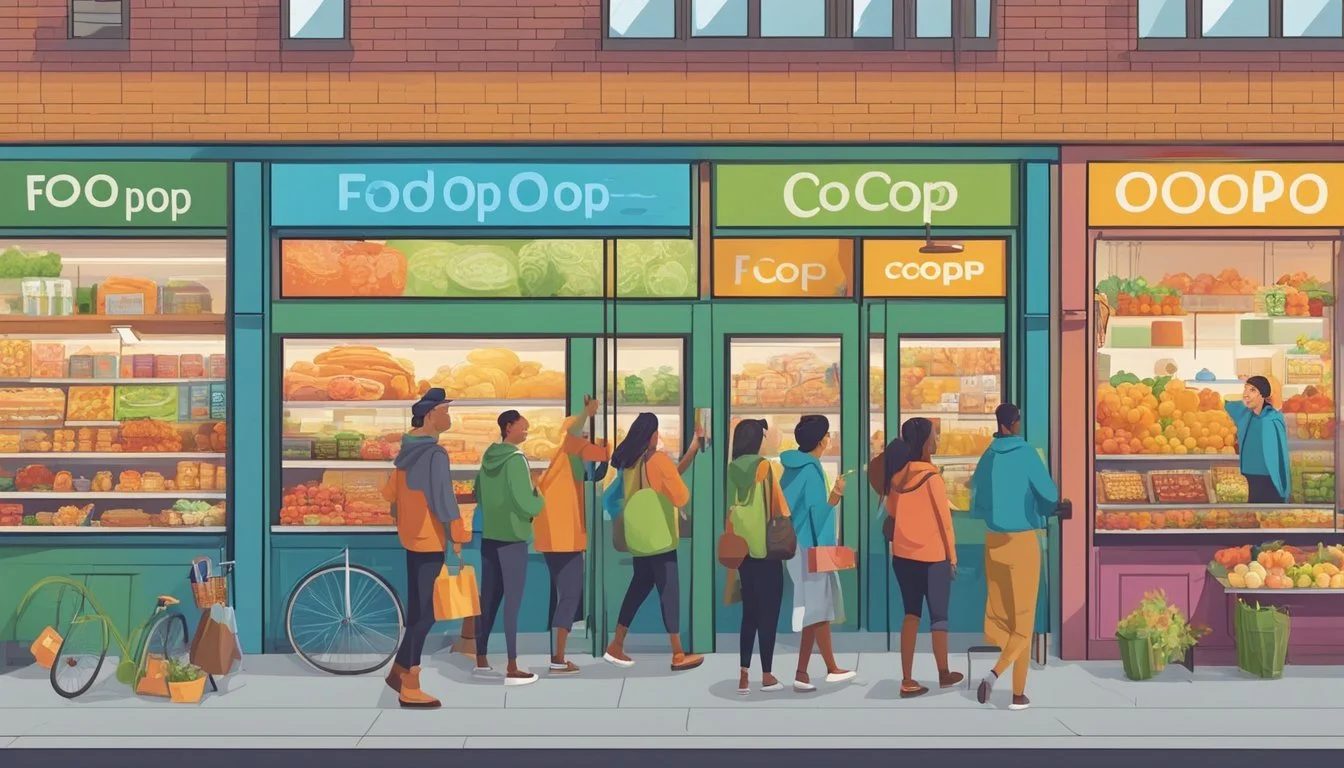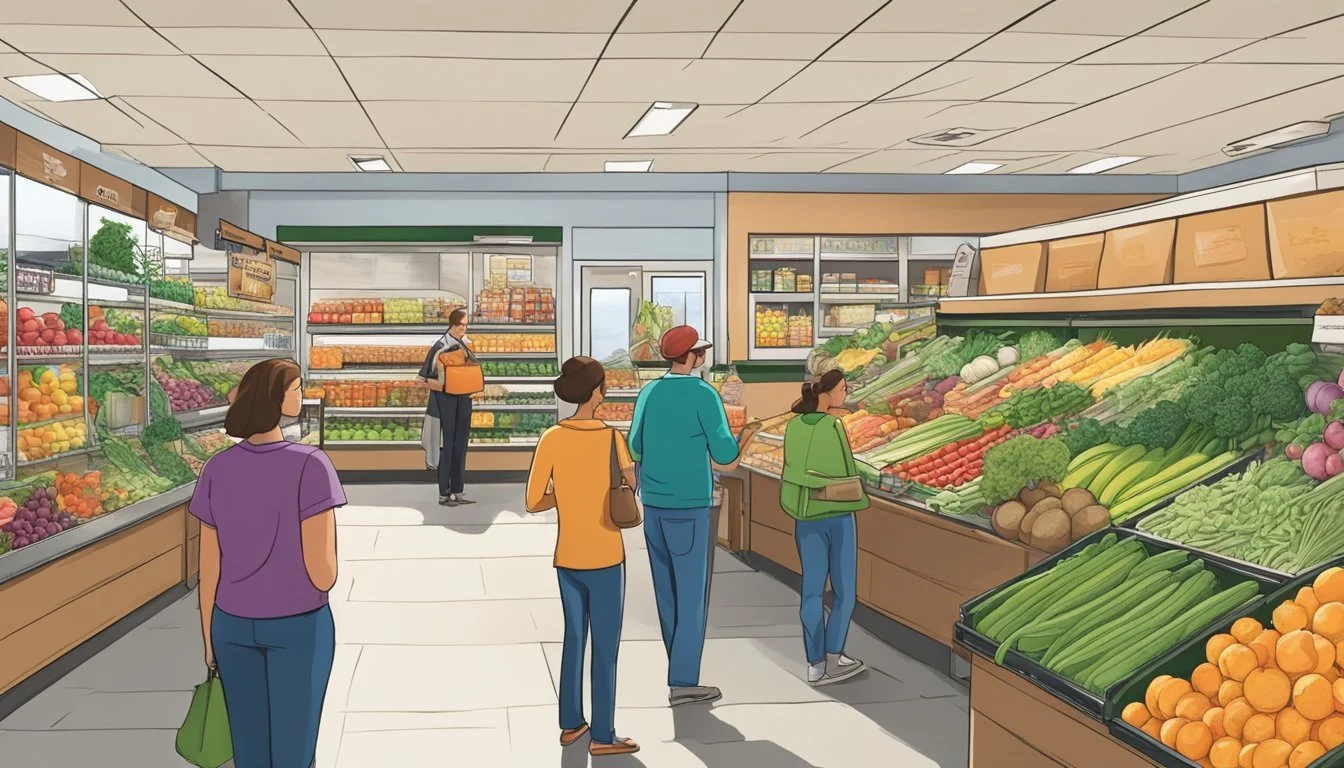Guide to Food Co-Ops in Billings, MT
Your Essential Shopping Resource
Billings, Montana, is a community that values sustainability and health, reflected in the local food scene. It is home to Good Earth Market, the only co-op grocery store in the area that specializes in healthy food offerings. Established in 1994, this place not only provides options for individuals to purchase nutritious foods but also emphasizes the importance of community and environmental well-being. A food co-op like Good Earth Market is an integral part of the local food system, supporting regional growers and producers, which in turn bolsters the local economy.
Food co-ops are unique in that they operate on a membership basis, but they typically allow non-members to shop as well. In Billings, residents and visitors alike have the opportunity to participate in a shopping experience that prioritizes organic, locally-sourced, and environmentally friendly products. The co-op's existence is a testament to Billings' commitment to community-based food resources that prioritize accessible healthy food options for all.
As the guide to food co-ops in Billings is explored, it's clear that places like Yellowstone Valley Food Hub also contribute to the local food culture by providing a centralized location for local producers to sell their goods. The collaborative efforts of these food hubs and co-ops ensure that residents of Billings have access to fresh, high-quality food while supporting the sustainability of their food systems.
Understanding Food Co-Ops
Food co-ops in Billings, MT offer local communities an alternative to conventional grocery stores, emphasizing organic produce, cooperative values, and a worker-owner model that distinguishes them from their competitors.
Defining Cooperatives and Their Principles
A food co-op operates on a cooperative model where it is owned and democratically controlled by its members. These members, often from the local community, uphold a set of principles including voluntary and open membership, democratic member control, member economic participation, autonomy and independence, education, cooperation among cooperatives, and concern for community.
Benefits of Joining a Food Co-Op
Members of a food co-op typically enjoy several benefits such as access to high-quality, often locally sourced and organic, products. By having a stake in the co-op, members have a voice in its operations, allowing them to foster local economic growth and reinforce community ties. Additionally, profits are often reinvested into the co-op or returned to members, rather than being distributed to external shareholders.
Differences Between Food Co-Ops and Conventional Grocery Stores
Food Co-Ops differ significantly from conventional grocery stores. A major distinction lies in their member-ownership structure, which directly influences their priorities and operations. While conventional grocery stores might focus on maximizing profits for external shareholders, food co-ops prioritize:
Community Values: Reinforcing local growth and connections.
Product Selection: Emphasizing organic, locally sourced goods.
Economic Model: Operating under a worker-owner model that benefits members.
Cooperation Over Competition: Working alongside other co-ops and local businesses rather than directly competing.
In summary, food co-ops are community-focused entities that offer a unique alternative to conventional grocery stores, aligning closely with the values and needs of their members.
The Role of Food Co-Ops in the Community
Food co-ops in Billings, MT play a pivotal role in fostering strong local food systems, boosting the local economy, and empowering communities through education and advocacy efforts. They serve as critical hubs for connecting consumers with local producers.
Supporting Local Producers and Economies
Local Producers Benefit: Food co-ops prioritize sourcing from local producers, thus ensuring that more dollars circulate within the community. They:
Create Marketplaces for local farmers and artisans, increasing visibility and sales opportunities.
Stimulate Local Economies by keeping the financial cycle close to home, with a multiplier effect on jobs and livelihoods.
Driving Community Empowerment
Empowerment through Cooperation: By operating on a cooperative model, these entities provide:
A sense of Shared Ownership and decision-making in the local community, allowing members to influence business practices and products offered.
Financial Benefits back to their members in the form of patronage dividends or discounts, promoting a more equitable distribution of resources.
Education and Advocacy Efforts
Informative Initiatives: Co-ops are not merely retail spaces but also centers for learning and activism. They:
Organize Workshops and Classes on nutrition, sustainable practices, and culinary skills to inform and uplift community knowledge.
Act as Advocates for food justice, sustainability, and community health, shaping policies both locally and nationally.
Billings' Food Co-Ops Landscape
In Billings, Montana, food co-operatives offer a unique blend of local sourcing and community-centric retail. These markets have become pivotal in providing access to quality, locally produced food.
Spotlight: Good Earth Market
Good Earth Market stands out in Billings' co-op scene for its dedication to local products. It operates with the ethos of supporting local farmers, prioritizing the sale of regionally produced foods. The wide range of locally sourced offerings includes organic fruits and vegetables, attending to consumers' desire for fresh, quality food while supporting the local economy.
Comparison with Nearby Markets
Comparing Good Earth Market to nearby conventional markets, one notices key differences:
Local Food Selection: Good Earth Market excels in offering a distinct variety of foods grown within the region, whereas mainstream markets may prioritize a global supply chain.
Community Relationships: The co-op model fosters a closer link between consumers and local producers that is less prevalent in larger chain stores.
By maintaining these characteristics, Billings' co-ops like Good Earth Market present a competitive and appealing alternative for consumers seeking locally produced food and a community-oriented shopping experience.
Membership and Ownership
In food co-ops, membership often equates to ownership, empowering members with control and decision-making capabilities. Ownership reflects a financial and participatory commitment to the cooperative.
How to Become a Member
To become a member of a food co-op in Billings, one typically must pay a fee or purchase a share of the cooperative, thereby gaining ownership and the right to participate in the governance of the organization. This fee can range from nominal to a more substantial investment, reflecting the member-owned structure of cooperatives.
Rights and Responsibilities of Members
Members possess voting rights and can influence the co-op's direction. They are responsible for electing a board of directors and can participate in decision-making processes. The rights include receiving certain benefits, such as discounts on goods. In exchange, they must uphold cooperative principles and engage in the co-op's activities and development.
Non-Members' Access to Co-Ops
Non-members may have limited access to the cooperative's services or products. While they can shop at the co-op, they may not receive the benefits reserved for members, like discounts or the ability to vote on co-op matters. The cooperative model is designed to encourage membership for a fully participative and democratic experience.
The Financial Aspects of Food Co-Ops
In a food co-op in Billings, MT, understanding the intricacies of finances, from pricing strategies to tax obligations, is crucial for sustainability and growth.
Understanding Pricing and Sales
Food co-ops often strive to offer competitive pricing while ensuring financial viability. Pricing of the products they sell is typically based on covering costs, which include sourcing goods, operating expenses, and supporting staff wages, while also reflecting the quality and value of locally sourced and organic items. Sales strategies can include member discounts or sales promotions to increase volume, directly impacting cash flow and financial health.
Funding and Managing a Co-Op
Funding a food co-op can involve a mix of member equity, loans, grants, and community fundraising. The management must ensure that there is adequate cash on hand for daily operations, which means careful budgeting and financial planning. Co-ops often adopt a democratic management style, with members having a say in major decisions, but it is crucial that a dedicated team handles the daily financial activities, which includes bookkeeping, cash management, and marketing efforts to promote sales.
The Role of the IRS and Nonprofit Status
Regarding taxation, the IRS has specific guidance for cooperatives. A food co-op must comply with IRS rules to maintain any nonprofit status, which includes allocating income on a cooperative basis and distributing net income to members. Ensuring at least 20% of the net income is paid to members annually in cash is crucial. Nonprofit status can influence marketing strategies, as it could be a selling point for the community-focused values of the co-op. However, maintaining this status requires strict adherence to IRS regulations, which will avoid complications and ensure continued benefits.
Shopping Experience at Food Co-Ops
When shopping at a food co-op in Billings, MT, customers can expect to find a range of organic and healthy foods within a community-oriented environment. Here, the focus is on quality groceries and a unique experience that extends beyond just products on a shelf.
Offerings Beyond Groceries
Food co-ops oftentimes provide an array of organic products outside of typical grocery fare. Shoppers might find:
Bakery: Freshly baked breads and pastries, often sourced from local ingredients.
Cafe: A small eating area serving coffee and light meals, fostering a communal space for members and visitors.
Customer Service and Store Ambiance
At a food co-op, customer service is paramount, as these stores thrive on building relationships with their clientele. They typically offer:
Personalized Assistance: Employees are generally well-informed and eager to help shoppers learn about organic food and healthy foods.
Community Feel: The store atmosphere is inviting, aiming to make shopping a pleasurable and relaxed experience.
Challenges and Survival Strategies
Food co-ops in Billings like the Yellowstone Valley Food Hub, while contributing positively to the local food economy and community, face significant hurdles. Survival in today's market requires navigating intense competition and innovating within their business models to remain sustainable and relevant.
Competition with Mainstream Retailers and Online Sales
Food co-ops operate in a highly competitive space, contending directly with mainstream retailers such as Walmart and Costco. These larger stores leverage their extensive supply chains to offer lower prices, a broader selection of goods, and convenience, factors which greatly appeal to consumers. Additionally, online retail giants like Amazon have captured a significant share of the food market, offering quick delivery and competitive pricing. To remain competitive, co-ops must harness the strength of their community focus and ethos of quality and sustainability, emphasizing the value of buying local and supporting the local economy.
Innovations in Co-Op Business Models
Adaptation and innovation are critical for the sustainability of cooperative businesses. Co-ops in Billings are adopting new strategies to thrive:
Tailoring Inventory: Prioritizing local, organic products that align with consumer demand for health-conscious options.
Enhancing Member Value: Offering member discounts, special events, and including members in governance to foster a stronger community connection.
Developing Online Presence: Strengthening online sales platforms to meet the convenience demands of modern consumers.
Educational Initiatives: Hosting workshops and activities to educate the community on food sources, preparation, and nutrition, positioning themselves as knowledge centers for healthy living.
Through these strategies, co-ops aim to strengthen their position and ensure their long-term presence in the Billings area.
Future of Food Co-Ops in Billings
The trajectory of food co-operatives in Billings, MT, remains intertwined with nationwide trends and local food movements. National Co+Op Grocers, a business services cooperative for retail food co-ops across the United States, has bolstered the consumer co-op model, as seen in various communities, and it continues to support the evolution of co-ops in Billings.
The future of these establishments seems favorable, due to their strong focus on local foods and embracing of trends that resonate with consumers' increasing desire for sustainability and community ownership. For example:
Regenerative Agriculture: Emphasis on farming methods that aim to rehabilitate and enhance the entire ecosystem
Local Producer Support: Strengthening relationships with local farmers and suppliers
Educational Initiatives: Enhancing consumer awareness regarding the importance of organic and locally-sourced products
The food co-op in Billings is likely to see growth, as:
They invest in local economies
Provide educational opportunities about food sources
Enhance local food security
With these ongoing initiatives, Billings' food co-ops are expected to continue thriving in a retail landscape that increasingly values health, sustainability, and community involvement.










